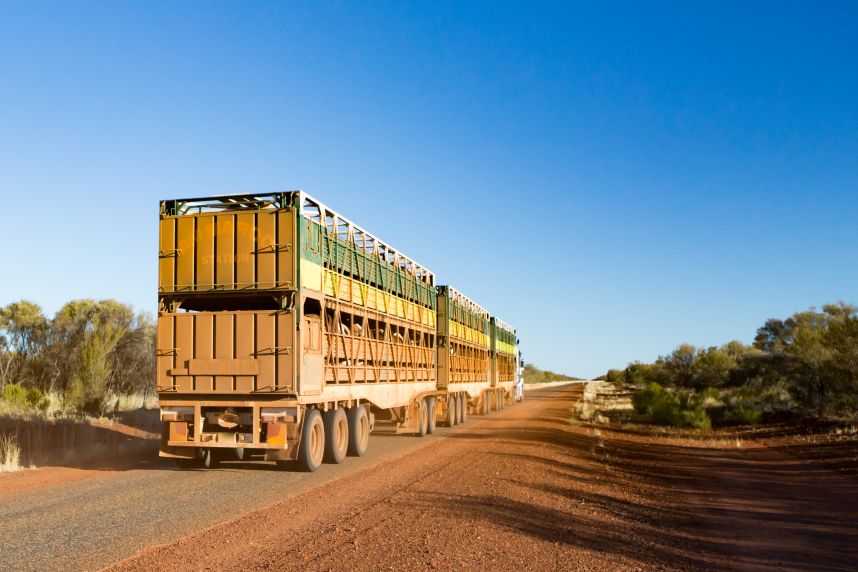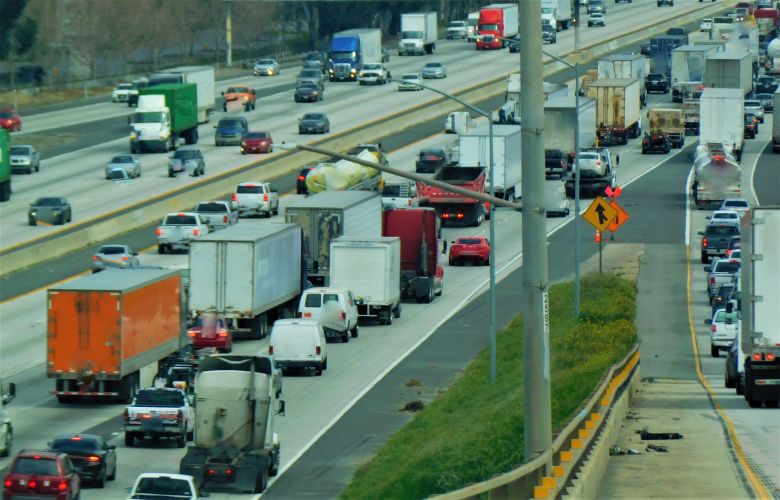Welcome to an insightful exploration of road haulage and its transformative impact on your supply chain and logistics operations. In today’s fast-paced business landscape, the efficient transportation of goods plays a crucial role in maintaining a competitive edge. Road haulage, a fundamental component of the logistics industry, refers to transporting goods by road from one location to another.
This article will delve into the essence of road haulage and uncover its significance in optimizing your supply chain processes. We will also explore strategies and best practices to maximize road haulage services, empowering you to enhance logistics efficiency, minimize costs, and streamline operations.
So, let’s embark on this journey and discover how road haulage can be a game-changer for your business!
What is Road Haulage?
Road haulage refers to transporting goods by road from one location to another. It is a crucial component of the logistics industry, playing a vital role in the movement of goods across various sectors. Road haulage involves using trucks, vans, or other heavy commercial vehicles to transport goods, providing a flexible and accessible mode of transportation.
Whether delivering products to retailers, transporting raw materials to manufacturing facilities, or distributing goods to end customers, road haulage offers a reliable and efficient solution. With its extensive reach and connectivity, international road haulage is a cornerstone of logistics, enabling businesses to optimize their supply chain operations and ensure timely delivery of goods.
Advantages of Road Haulage in Supply Chain Optimization
Let’s explore the key advantages of road haulage and how they contribute to supply chain optimization. From flexibility and accessibility to cost-effectiveness and reliability, road haulage offers businesses a wide range of benefits that enhance their overall supply chain management.
Extensive Reach and Accessibility
The advantage of extensive reach and accessibility in the road haulage business cannot be overstated. Road networks span across vast territories, connecting urban and rural areas alike. This accessibility allows businesses to reach customers in remote locations, opening new markets and expanding their customer base. Unlike other modes of transportation, road haulage provides direct access to destinations without the need for intermediate handling or transfers, ensuring efficient and timely deliveries. Whether delivering goods to retail stores in urban centers or reaching customers in rural areas, road haulage offers unmatched accessibility, making it a preferred choice for businesses looking to optimize their supply chain and reach a wide range of customers.
Flexibility in Route Planning
One of the key advantages of road haulage is the flexibility it provides in route planning. Businesses can tailor their routes based on specific requirements, such as delivery deadlines, traffic conditions, or customer preferences. This flexibility allows for dynamic decision-making, enabling businesses to optimize their routes for efficiency and cost-effectiveness. Road haulage offers multiple route options, enabling businesses to navigate around traffic congestion or road closures, ensuring timely deliveries, and minimizing disruptions.
Choosing the most efficient routes based on real-time conditions empowers businesses to adapt quickly to changes and optimize their supply chain operations. Flexibility in route planning also facilitates consolidating multiple deliveries, reducing the number of trips, and optimizing resource utilization. By leveraging the flexibility of road haulage in route planning, businesses can effectively enhance their supply chain efficiency and meet customer expectations.
Cost-effectiveness and Efficiency
Road haulage is known for its cost-effectiveness and efficiency, making it an attractive option for businesses aiming to optimize their supply chain. Road haulage often offers more affordable rates for shorter distances or smaller shipments than other modes of transportation, such as air or rail. It eliminates the need for additional handling or transshipment, reducing the overall cost of transportation.
Additionally, road haulage allows businesses to optimize their vehicle utilization by consolidating multiple shipments, minimizing empty trips, and maximizing the payload capacity. This efficiency results in lower fuel consumption, reduced carbon emissions, and cost savings.
Reliability and Timeliness
Regarding supply chain optimization, reliability and timeliness are crucial factors. Road haulage offers high reliability, ensuring that goods are transported according to schedule. With well-established road networks and regular transportation services, businesses can consistently rely on road and haulage companies to meet delivery deadlines.
Road haulage provides a reliable and predictable transportation solution, unlike other modes of transportation that may be subject to delays or disruptions due to weather conditions or infrastructure limitations. This reliability translates into improved inventory management, reduced stockouts, and enhanced customer satisfaction. Timely deliveries enable businesses to meet customer demands promptly, maintain production schedules, and establish a reputation for reliability in the market.
Versatility for Different Types of Goods
Road haulage is highly versatile and can accommodate a wide range of goods, making it suitable for diverse industries. From perishable goods requiring temperature-controlled transportation to oversized or fragile items that need specialized handling, road haulage offers the flexibility to transport different types of goods.
The availability of various types of vehicles, including vans, trucks, and trailers, allows businesses to choose the appropriate mode of transportation based on their specific requirements. This versatility ensures that goods can be transported safely and efficiently, regardless of their nature or size.
Businesses operating in retail, food and beverage, manufacturing, and construction industries benefit from the versatility of road haulage, as it provides a reliable and cost-effective solution for transporting their goods.
Are you ready to make the most of road haulage for your supply chain and logistics needs?
Contact Growth Hackers
Strategies for Maximizing Road Haulage Efficiency
Let’s explore some strategies for maximizing road haulage efficiency.
Route Optimization
Route optimization is a key strategy for maximizing road haulage efficiency. Businesses can identify the most efficient and cost-effective delivery routes by leveraging advanced route planning software and real-time traffic data.
This involves considering distance, traffic congestion, and delivery time windows. By optimizing routes, businesses can minimize travel distances, reduce fuel consumption, and maximize the number of deliveries per trip.
This not only improves overall efficiency but also helps to lower transportation costs and reduce carbon emissions. Route optimization also enables businesses to proactively avoid road closures or traffic delays, ensuring timely deliveries and minimizing disruptions to the supply chain.
Load Consolidation
Load consolidation is an effective strategy for maximizing road haulage efficiency by optimizing available cargo space. By consolidating multiple smaller shipments into a single load, businesses can reduce the number of trips, minimize space in heavy commercial vehicles, and maximize payload capacity. This reduces fuel consumption and transportation costs while increasing overall efficiency.
Load consolidation also enables businesses to better utilize their fleet, improving resource allocation and reducing environmental impact. By efficiently combining shipments, businesses can achieve economies of scale and enhance their supply chain operations.
Effective Fleet Management
Effective fleet management is crucial for maximizing road haulage efficiency. It involves various strategies such as proper maintenance, regular inspections, and efficient vehicle utilization.
By conducting routine maintenance checks, businesses can ensure their fleet is in optimal condition, minimizing breakdowns and delays. Proper vehicle utilization involves analyzing demand patterns, optimizing delivery schedules, and minimizing empty trips. This can be achieved through techniques like backhauling, where vehicles carry return loads to maximize efficiency.
Effective fleet management also includes driver training programs, efficient routing, and real-time tracking to monitor vehicle performance and ensure regulation compliance. By implementing comprehensive fleet management practices, businesses can enhance efficiency, reduce costs, and improve customer satisfaction.
Embracing Technology
Embracing technology is a vital strategy for maximizing road haulage efficiency. Adopting advanced technologies such as telematics, GPS tracking systems, eCommerce logistics automation and route optimization software enables businesses to streamline operations, improve decision-making, and enhance overall efficiency.
Telematics systems provide real-time data on vehicle performance, fuel consumption, and driver behavior, allowing businesses to identify areas for improvement and optimize resource allocation. GPS tracking systems offer accurate and up-to-date information on the location of vehicles, enabling businesses to monitor deliveries, provide real-time updates to customers, and proactively address any potential delays or issues.
Route optimization software utilizes algorithms to determine the most efficient routes, considering traffic conditions and delivery constraints. Needless to say that Ai is transforming the shipping, logistics and supply chain industry. By embracing technology, businesses can automate processes, increase visibility, and drive significant improvements in road haulage efficiency.
Collaborative Partnerships
Collaborative partnerships play a crucial role in maximizing road haulage efficiency. Businesses can enhance collaboration and optimize the entire supply chain by establishing strong relationships with suppliers, customers, and logistics service providers.
This includes sharing information, coordinating delivery schedules, and implementing shared distribution networks. Collaborative partnerships can also involve the consolidation of shipments between multiple companies to achieve economies of scale and reduce transportation costs.
Overcoming Challenges in Road Haulage for Improved Logistics
Now that we have gone through the strategies let’s dive into the challenges faced in haulage and highlight effective solutions to overcome them.
Traffic Congestion Management
Traffic congestion poses a significant challenge in road haulage operations. As urban areas continue to grow, road networks often struggle to accommodate the increasing volume of vehicles. Congestion can lead to delays, longer travel times, and reduced efficiency in supply chain operations. To overcome this challenge, businesses can employ various strategies, such as implementing real-time traffic monitoring systems, utilizing route optimization software, and adjusting delivery schedules to avoid peak traffic hours. Collaboration with local transportation authorities and adopting alternative delivery options like off-peak or nighttime deliveries can also help alleviate traffic congestion and improve logistics efficiency.
Driver Shortage and Retention
The shortage of qualified and experienced drivers is a persistent challenge in the road haulage industry. Finding and retaining skilled drivers has become increasingly difficult, leading to higher recruitment costs and potential disruptions in operations. To overcome this challenge, businesses can focus on implementing driver retention programs, offering competitive salaries and benefits, providing ongoing training and career development opportunities, and fostering a positive work environment.
Collaborating with driver training schools and engaging in recruitment efforts can also help address the driver shortage. Additionally, embracing technology and vehicle automation can alleviate the burden on drivers and make the profession more attractive.
Deliver excellence on every mile or kilometer with top-of-the-line road haulage today!
Fuel Price Volatility and Efficiency
Fuel price volatility poses a challenge in road haulage, directly impacting transportation costs and profitability. Fluctuating fuel prices make it challenging for businesses to accurately forecast expenses and budget effectively. To mitigate this challenge, businesses can focus on improving fuel efficiency by optimizing routes, adopting fuel-saving technologies, and implementing driver training programs that promote eco-friendly driving practices.
Regular vehicle maintenance and ensuring proper tire inflation can also improve fuel efficiency. Additionally, businesses can explore alternative fuel sources or light commercial vehicles such as electric or hybrid vehicles, to reduce dependence on fossil fuels and mitigate the impact of fuel price volatility.
Regulatory Compliance and Documentation
Road haulage is subject to various regulations and documentation requirements, which can be complex and time-consuming. Non-compliance can lead to penalties, delays, and disruptions in supply chain operations. To overcome this challenge, businesses should stay updated on relevant regulations, maintain accurate records, and ensure proper documentation for each shipment.
Technology solutions for automated record-keeping, electronic document management, and compliance monitoring can streamline regulatory compliance processes. Collaborating with industry associations and seeking legal counsel can provide guidance and support in navigating the regulatory landscape.
Infrastructure Limitations and Road Conditions
Infrastructure limitations and poor road conditions pose challenges in road haulage operations, particularly in the automotive and transportation sectors. Insufficient road capacity and outdated infrastructure hamper market growth and hinder market expansion. However, businesses can address these challenges by collaborating with government agencies on seven national highway projects to improve road capacity and rest areas.
Investing in technologies for real-time updates on road conditions and employing route planning software that accounts for infrastructure limitations can optimize freight transport. Additionally, considering alternative transportation modes like rail or waterways for specific supply chain segments contributes to the success of national transportation projects. It mitigates infrastructure limitations’ impact on road haulage.
Security and Risk Management
Security and risk management are crucial considerations in road haulage operations. The risk of theft, cargo damage, accidents, and other security threats can disrupt the supply chain and result in financial losses. To overcome this challenge, businesses can implement security protocols such as GPS tracking systems, secure parking facilities, and driver training on security measures.
Collaborating with trusted logistics partners, conducting thorough background checks on employees, and investing in insurance coverage can also help mitigate security risks in domestic road haulage. Furthermore, establishing contingency plans, conducting risk assessments, and regularly reviewing security procedures can enhance overall security and risk management in road haulage operations.
Final Words on Road Haulage
Road haulage stands as a critical pillar in the world of logistics, facilitating the movement of goods and optimizing supply chains. It offers extensive reach, flexibility in route planning, and cost-effective solutions for businesses. Despite its challenges, such as traffic congestion, driver shortages, and regulatory compliance, road haulage can be overcome with strategic approaches.
By embracing technology, fostering collaborative partnerships, and prioritizing efficiency and sustainability, businesses can unlock the full potential of the global road haulage market. With continuous innovation and adaptation to evolving industry trends, road haulage will continue to play a vital role in logistics optimization and ensuring smooth, timely deliveries for businesses worldwide.
Growth Hackers is an experienced Amazon marketing agency helping businesses from all over the world grow. There is no fluff with Growth Hackers. We help entrepreneurs and business owners improve their logistics and supply chain with road haulage, increase their productivity, generate qualified leads, optimize their conversion rate, gather and analyze data analytics, acquire and retain users and increase sales. We go further than brand awareness and exposure. We make sure that the strategies we implement move the needle so your business grow, strive and succeed. If you too want your business to reach new heights, contact Growth Hackers today so we can discuss about your brand and create a custom growth plan for you. You’re just one click away to skyrocket your business.










